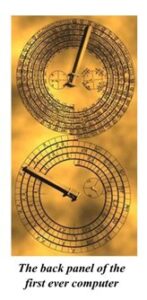 Was it the first one?
Was it the first one?
It answered a question many ask about Ancient Greece, how did they know:
- the time
- what year they were in?
- when the four year cycle of the Olympiad had passed?
Today, we know this because we have clocks, watches and, of course, mobile phones but in Ancient Greece they didn’t have any of these, so how did they know?
Then, the world learnt in 1901
Just off an island, called Antikythera, in the Aegean Sea, a wreck was found. It was a sunken Ancient Greek cargo ship, and on that ship, an amazing device was discovered that gave us the answer.
On board they found a mechanical device that appeared to have been used to calculate and display information about astronomical phenomena.
They gave it the name “The Antikythera Mechanism”, because that’s where it was found, a mechanical device that could calculate and display information about astronomical occurrences.
Basically, it was a computer!
Yes, a simple analogue computer.
It is thought to be one of the most complex and sophisticated machines that we know existed in the ancient world.
The device was made up of at least 30 bronze gears housed in a wooden case. Then on the case, would you believe it, was engraved the instructions as to how it should be used.
They think that it was manufactured somewhere around 100 BCE, give or take 30 years.
Then the scientists got to work
They discovered that it was able to predict the positions of the Sun, Moon, and planets, as well as the phases of the moon, solar and lunar eclipses, all this without a microchip!
They found that it recorded the four-year cycle of athletic games held in ancient Greece, yes, the Ancient Olympic Games.
Are there any other mechanisms?
We don’t know, but we do think there are other interesting ones around. This is because even though it is the only known physical survivor, we recognise that there was a long tradition of mechanical astronomical devices.
This is something we have learnt from Greco-Roman literature, chiefly from the writings of Marcus Tullius Cicero in the 1st century BC and Archimedes in 3rd century BC.
We have to be honest.
We don’t know exactly what the Antikythera Mechanism was used for, and we don’t know if the bronze-geared technology along with the advanced mechanical design skills involved in putting it together were used in other products within the Greco-Roman world.
Can we see it today?
You can see the remains of this amazing machine, which are on show at the National Archaeological Museum in Athens.
The message.
Discoveries of ancient artifacts like the Antikythera Mechanism tell us so much about the resourcefulness of the Ancient Greek civilization. It explains how they were able to reach hights of technological sophistication along with a level of knowledge and an understanding of the cosmos that until 1901 we didn’t even know existed.
Therefore, does this answer the question, was it the first computer or were there others?
I think so.
Isn’t History fun?
10 Questions to ask you on this subject:
- What led researchers to believe that Ancient Greece might have had a form of a computer?
- How did people in Ancient Greece determine the passage of time and keep track of years?
- What was discovered in 1901 off the coast of Antikythera, and what did it reveal about ancient technology?
- What is the Antikythera Mechanism, and why is it considered a significant find?
- How does the Antikythera Mechanism function, and what makes it a primitive form of a computer?
- Why was it named the “Antikythera Mechanism,” and where was it found?
- Can you elaborate on the complexity and sophistication of the Antikythera Mechanism’s design?
- What astronomical phenomena could the Antikythera Mechanism predict and record?
- Were there other similar mechanisms mentioned in the article, and what evidence supports their existence?
- What does the discovery of the Antikythera Mechanism reveal about the technological and intellectual capabilities of Ancient Greek civilization?
For more information go to:
https://interestingengineering.com/innovation/antikythera-mechanism-2000-year-old-computer
https://blog.sciencemuseum.org.uk/ancient-greek-computing/
https://www.byteside.com/2021/03/antikythera-mechanism-solved-ultimate-ancient-nerd-puzzle/

